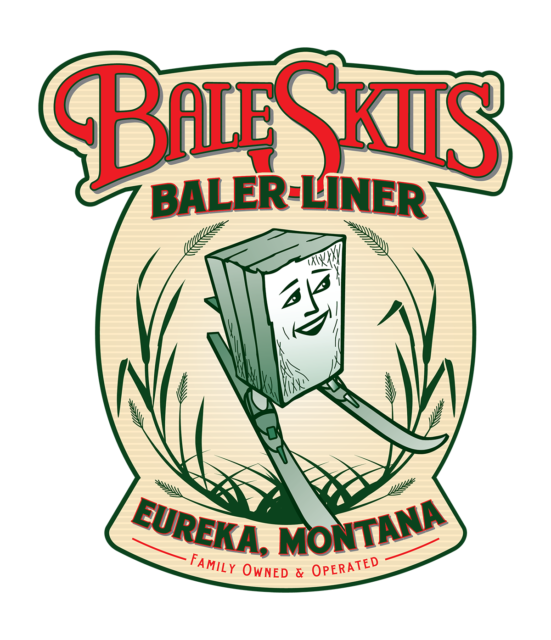We were loading at either Sailor Creek or Black Mesa, both south of the Snake River in the Glenn’s Ferry, Idaho area. The entrance to the potato cellar we were hauling out of was a thick, spongy mud.
The trucks would not spin out, but power out as they tried to leave the cellar loaded. A big, articulated, four-wheel drive farm tractor was on the site, and was pulling just about every truck out of the cellar.
My truck did no better than the rest and it was the driver’s job to get down in the muck and find a suitable anchor point to attach the tow chain to the truck.
I got the chain secured around the frame of the truck and then felt something pressing hard against my back. I realized that the tractor had rolled backwards and was in contact with my tender, sensitive body.
I didn’t have time to think. I cut loose with the loudest, most blood-curdling scream I could muster to get the attention of the tractor driver.
The tractor moved forward and off of me. When the tractor driver realized that he was about to become the casualty of the evening, he explained that the brakes on the tractor just barely worked, and he usually changed gears after he had the tractor in position to be hooked up to the truck so he could control it with the clutch and transmission if it rolled in spite of what brakes it had.
About that time the driver in another truck waiting to load came running up. He said he heard someone scream, and was afraid he would have to help pick up a corpse. I told him that if I could get to the tractor driver he may get his wish.
How many things were wrong here?
1. I turned my back on a machine that I did not know was securely stopped.
2. I had not made contact with the driver of the tractor so he knew I was moving in the path of his machine, and that I at least had his assurance that I was safe.
3. The brakes on the tractor were not maintained in good working condition.
4. The procedure was to wait until a truck was stuck before hooking up with the tractor. Especially since every single truck that day had to be pulled out by the tractor, the tractor should have been hooked up to the trucks on flat, level ground, and then helped all the way out. In addition to being safer than chaining up on an incline, that would have been grossly easier on both the tractor and the potato trucks.
5. The cable or chain used to attach the tractor to the potato trucks should have been long enough to keep the man hooking the cable or chain to the truck out of harm’s way.
6. There should have been a “spotter” to watch the hooking up and give warning to all parties involved. And finally for number seven, a load or two of coarse gravel would have eliminated the whole scenario to start with.
In 1964 I was just out of high school. I was operating a PTO- operated grain grinder/mixer. I had finished grinding the grain for that batch and had taken the PTO out of gear.
Before the PTO shaft stopped turning I started to step over it, only to have the still-turning shaft take a firm hold on my pant leg. Thankfully it had slowed to the point that the shaft stopped before it spun my body around it. It did not rip my Levi’s or even leave a bruise. But I was several minutes getting my eyeballs back into their sockets.
Here also we can list things that could have prevented this near- accident, starting with my move to step over a shaft that was still moving, and including the lack of a shield that would have at least partially compensated for my impatience.
The list of farm accidents goes on and on. Years back my brother sent me a newspaper clipping reporting the death of a young hay grower who had been one of my boy scouts in Grandview, Idaho years before.
Today I learned that a fellow had lost a hand while working on a forage chopper. He had been running the machine for the past eight years. Is it not human nature to become complacent with things that can harm us?
I was on the scene of an operation where a chemical was being applied to seed potatoes as they were cut into pieces and loaded into the planter. The owner’s son was declining to wear the respirators that the rest of the crew was wearing. An old man on the crew, who was wearing the required safety breathing apparatus, chimed in, “He’ll wonder where the tumor on his kidney came from in about twenty years.”
Consider those who handle and show dairy bulls. You haven’t lived until you face 2,000 pounds of fury which thinks you need to become part of the dirt and manure in the holding area.
Those who have the best chance of working with these animals uninjured never get over a healthy fear of them. They can never be trusted and when there is not a strong wall or corral between you and them, you dare not take your eyes off of them. Even a playful gesture by a big bull can be deadly.
The human brain is the best safety device known to man. It constantly reminds us that the seconds saved by failing to follow simple safety rules will be wasted by a fast trip to the hospital and then the days or weeks of dealing with OSHA inspectors.
The workings of the safety center in the brain are all but stopped by the use of alcohol and drugs. Other things which turn off this life-saving function are anger, fatigue and impatience.
Remember also that there is no mechanical device or safety rule that will compensate for stupidity. Some individuals, for their own safety and for the safety of others, should never operate certain types of equipment.
In closing, let me repeat that machinery feels no pain, sees no blood, hears no cries of pain and anguish nor feels the remorse of tears. If none of the above “rings your bell” as to paying attention to safety, consider this:
You will generally be displeased with the manner in which your friends attempt to console your widow. FG











